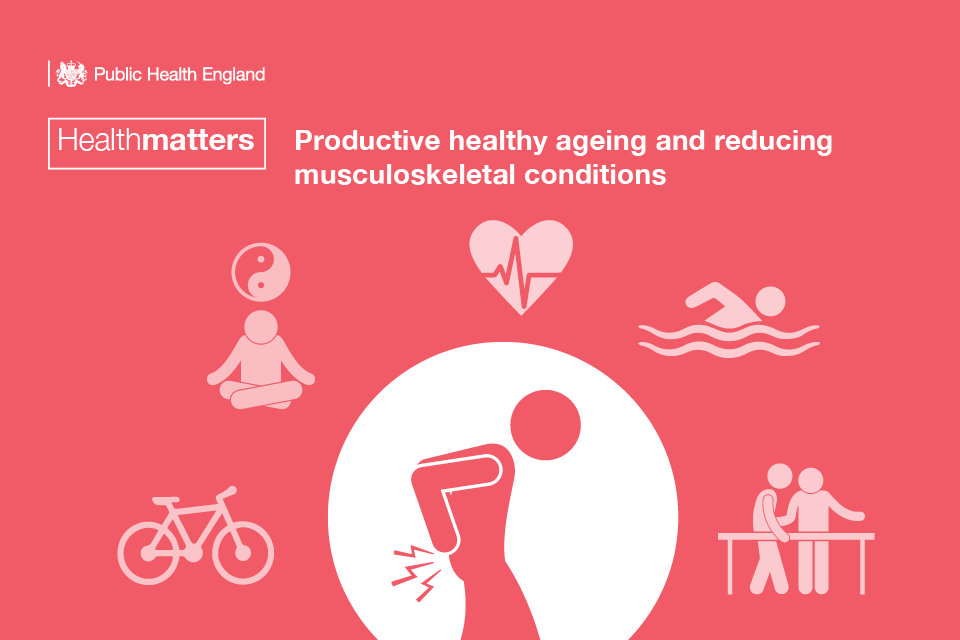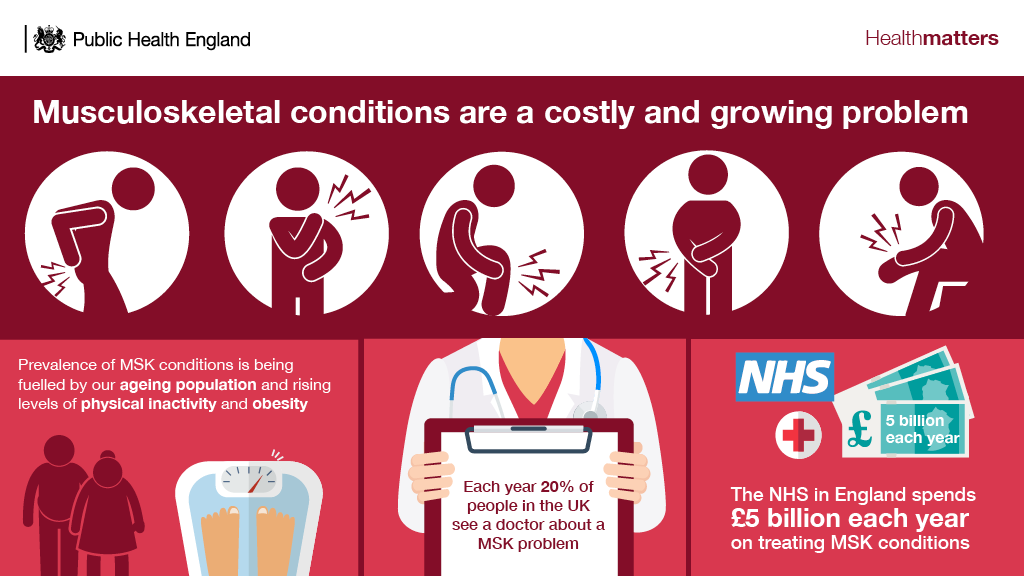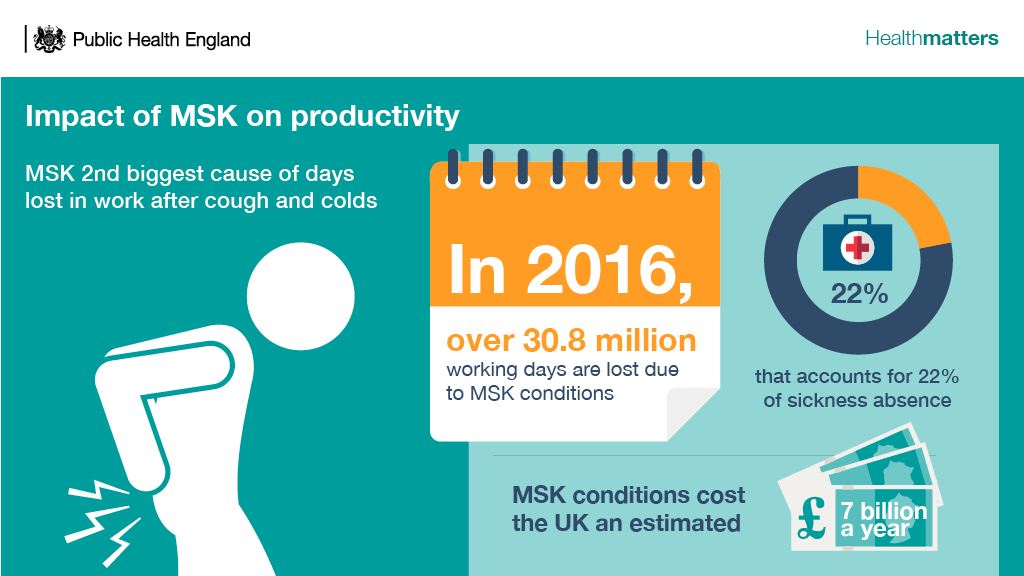
Welcome to the latest edition of PHE’s Health Matters, a resource for local authorities and health professionals, which for this edition focuses on productive healthy ageing and musculoskeletal (MSK) health.
There has been a steady increase in average life expectancy in recent decades, and there are now half a million people in their 90s in the UK, more than two and a half times the number in 1985. By 2041 in the UK there will be an estimated 3.2 million people aged 85 years and older.
This is a public health success story. Longer lives are a benefit to society in many ways, including financially, socially and culturally, because older people have skills, knowledge and experience that benefit the wider population.
There is an opportunity to utilise this increased longevity as a resource, whilst challenging ageism and the view that retirement is about ‘sitting more and moving less’.
As life expectancy rises, we must promote the concept of productive healthy ageing, as the opportunities available to each of us as we age are dependent on one key characteristic: our health. Productive healthy ageing includes:
- improved health and wellbeing
- increased independence and resilience to adversity
- the ability to be financially secure through work and build resources
- engagement in social activities
- being socially connected with enhanced friendships and support
- enjoying life in good health
However, the reality of the situation is that people are living longer in poorer health, particularly those in more deprived parts of the country. The older a person is, the more likely they are to experience chronic diseases and disabilities such as MSK, which can impact negatively on productive healthy ageing.
This latest edition of Health Matters focuses specifically on the burden of the three groups of MSK conditions:
- Inflammatory conditions such as rheumatoid arthritis
- Conditions of musculoskeletal pain such as osteoarthritis and back pain
- Osteoporosis and fragility fractures such as fracture after fall

As well as age, prevalence of MSK conditions is being fuelled by rising levels of physical inactivity and obesity, and poor health habits such as smoking. MSK conditions are a substantial problem for individuals and the NHS. Each year 20% of people in the UK see a doctor about a MSK problem and the NHS in England spends almost £5 billion each year treating them.

MSK also impacts productivity and employers: only 59.4% of people of working age with a MSK condition are in work, and in 2016, MSK problems were the second biggest cause of sickness absence, which accounted for over 30.8 million days lost in work (22.4% of total sickness absence). This costs the UK an estimated £7 billion a year.
Increasing age and reduced physical activity are two risk factors that often coincide. As people age, they take part in less physical activity. This edition of Health Matters focuses on what can be done to help individuals age in a productive and healthy manner, and thus prevent their risk of developing MSK conditions.
The key interventions that should be encouraged to patients by health professionals and commissioners are physical activity, maintaining a healthy weight and balanced diet, and smoking cessation.
Read this edition of Health Matters to find out how local authorities, commissioners, healthcare professionals, and the private and voluntary sectors can all contribute towards promoting productive healthy ageing and preventing the onset of MSK conditions. It includes a set of infographics and slides to support local commissioning and service delivery, as well as best practice case studies.
Visit the Health Matters area of GOV.UK to see the wide range of topics Health Matters has covered (other recent editions have looked at preventing infections and reducing AMR, alcohol and tobacco use, cervical screening, child dental health and obesity/food environment) or sign up to receive the latest updates through our e-bulletin.
And if you found this blog helpful, please view other Health Matters blogs.
This Health Matters edition has been sourced, developed and co-ordinated by PHE’s Older People’s team. PHE gratefully acknowledges our partnership with Arthritis Research UK who support PHE’s work on MSK conditions. For further information on MSK conditions contact ginder.narle@phe.gov.uk
Health Matters
Health Matters is a resource for professionals which brings together the latest data and evidence, makes the case for effective public health interventions and highlights tools and resources that can facilitate local or national action. Visit the Health Matters area of GOV.UK or sign up to receive the latest updates through our e-bulletin. If you found this blog helpful, please view other Health Matters blogs.

2 comments
Comment by B wilson posted on
People 60 plus should be regularly screened for B12 deficiency.the NHS could possibly save millions potentially as B12 deficiency can lead to falls and incorrect dementia diagnosis to name only a couple of things.Save our NHS funds;take the iniative.
Comment by Robin Lansman osteopath posted on
How does osteopathy fit into this framework? Osteopath AHPs mostly in the private sector with some in NHS roles and are now recognised by NHSEngland. Millions of patient visits are made to osteoapths each year, across the UK. This can be as their last resort and they are seeking a new approach to suit their needs. Osteoapths are well placed as primary care trained practitioners to relieve the burden of MSK conditons in the UK. Osteopaths specialise in multi factorial complex presentations that summate to become chronic cases that may not have demonstrable test findings. These cases conversely leave patients and their health carers without useful answers.